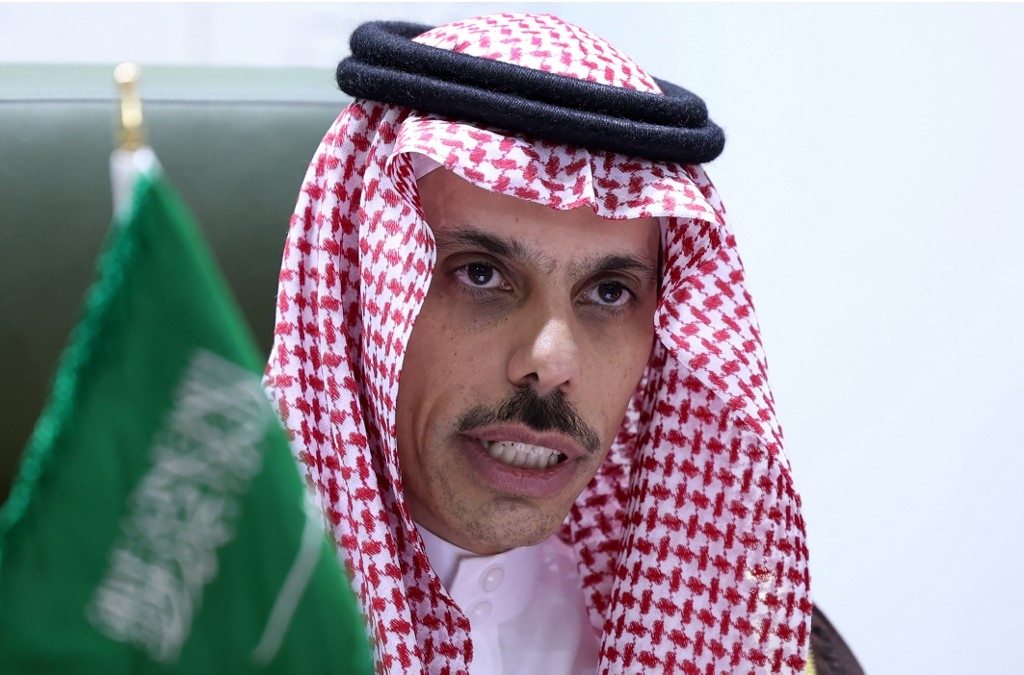Saudi foreign minister says normalisation with Israel would bring 'tremendous benefits'

Saudi Foreign Minister Faisal bin Farhan has said that a normalisation deal with Israel would be "extremely helpful" and bring "tremendous benefits" to the Middle East, during an interview with CNN.
Asked about the prospects of Saudi Arabia signing a normalisation deal with Israel, bin Farhan noted that there has been a proposed normalisation deal between the two countries since 2002, referring to the Arab Peace Initiative.
He added: “Normalising Israel's status within the region would bring tremendous benefits to the region as a whole. It would be extremely helpful, both economically but also socially and from the security perspective."
However, the minister poured cold water on the prospect of an agreement coming soon.
New MEE newsletter: Jerusalem Dispatch
Sign up to get the latest insights and analysis on Israel-Palestine, alongside Turkey Unpacked and other MEE newsletters
'Normalising Israel's status within the region would bring tremendous benefits to the region as a whole'
- Saudi Foreign Minister Faisal bin Farhan
"Now, that normalisation in the region can only be successful if we address the issue of the Palestinians and if we are able to deliver a Palestinian state within the 1967 border that gives the Palestinians dignity and their rights," he said.
The Arab Initiative was proposed during the Arab League summit in Beirut in 2002, at the peak of the Second Intifada. It demands Israel withdraw from the West Bank and Gaza Strip, which it occupied in 1967, and allow for the establishment of a Palestinian state in return for normalisation deals with Arab states.
Israel has long rejected engaging with the Arab Initiative. Last year, the scheme was essentially killed off completely by close Saudi ally the United Arab Emirates normalising ties with Israel, with the assistance of the Trump administration.
Bahrain, Sudan and Morocco all followed suit, in deals that failed to address the Palestinian issue or Israel's military occupation of the West Bank and its settlement expansion. The UAE claimed Israel had promised to suspend its plans to annex parts of the West Bank, though annexation had already been shelved due to international pressure and a lack of US support.
Bin Farhan said that before the Arab Initiative, Saudi Arabia presented the Fez Peace Initiative in 1981, "which puts forward the prospects for full and complete normalisation with Israel in return for a just settlement to the Palestinian issue".
Bin Farhan brushed off Israeli Prime Minister Benjamin Netanyahu's claim during his election campaign that Saudi Arabia would soon allow direct flights from Tel Aviv to Mecca. Mecca does not have an airport.
"We have not agreed to it, but as I said, if we have progress on the Israeli-Palestinian issue, then we would welcome, hopefully, Israeli citizens of all faiths in the kingdom, not just Muslims. But let's move forward with the peace process first," bin Farhan said.
Like other Arab countries around the Gulf, Saudi Arabia has forged strong clandestine ties with Israel in recent years. The two countries have no official diplomatic ties, yet Saudi de facto leader Crown Prince Mohammed bin Salman reportedly met Netanyahu in secret last November.
Middle East Eye delivers independent and unrivalled coverage and analysis of the Middle East, North Africa and beyond. To learn more about republishing this content and the associated fees, please fill out this form. More about MEE can be found here.

